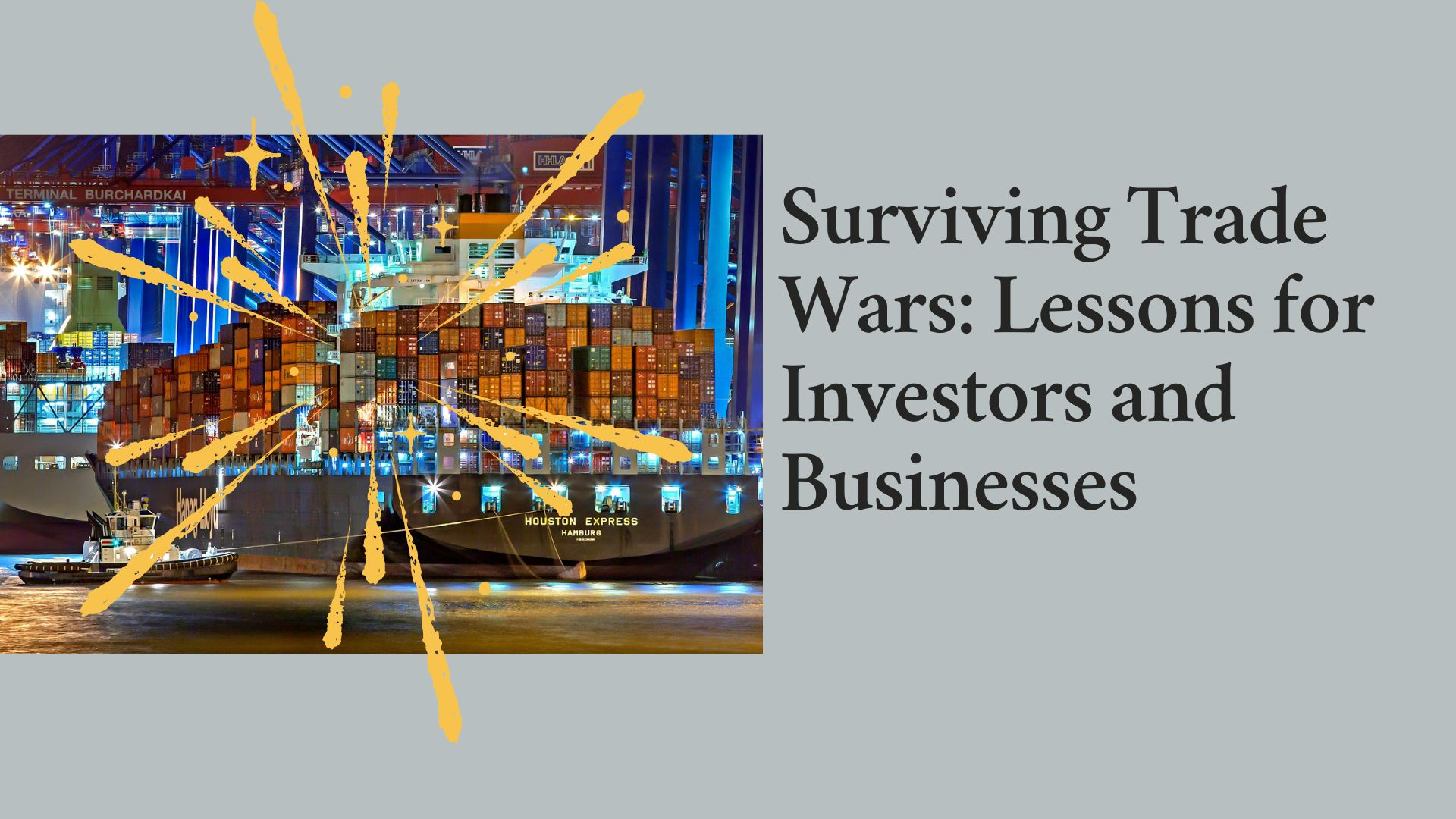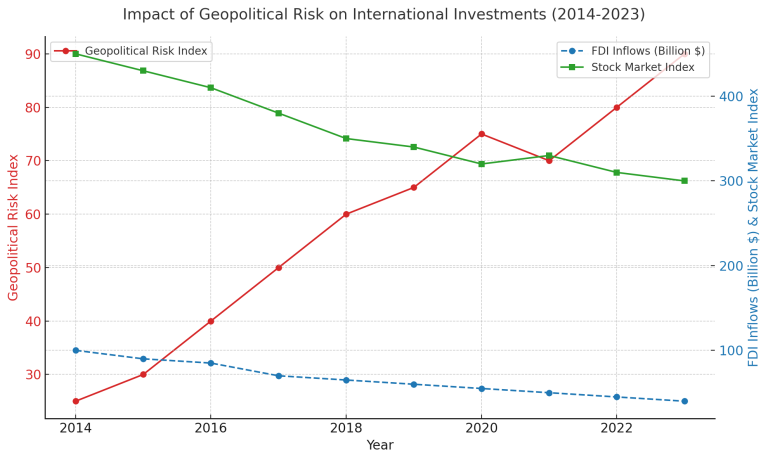Surviving Trade Wars: Lessons for Investors and Businesses
Trade wars can feel like the sudden appearance of storm clouds in an otherwise clear economic sky. When governments impose tariffs and restrictions on each other's goods and services, global markets often respond with uncertainty, impacting everything from stock prices to the cost of everyday items. But while trade wars can bring challenges, there are valuable lessons that investors and businesses can learn to better prepare, adapt, and even find new opportunities amid the turmoil.
Whether you’re an investor wondering how to protect your portfolio or a business owner trying to navigate fluctuating supply chains, here are some key insights to help you weather the effects of trade tensions.

1. Diversification Is Your Best Friend
For Investors:
One of the most important strategies for any investor during uncertain times is diversification. By spreading investments across different sectors, countries, or types of assets (like stocks, bonds, or commodities), you reduce the risk of being overly exposed to any single market or industry that might be directly impacted by trade restrictions.
For example, if you own stocks only in technology companies, and a trade war significantly impacts this sector, your entire portfolio may take a hit. By including other types of investments, like healthcare stocks or international funds, you create a safety net that cushions the blow.
For Businesses:
Just as investors need to diversify their portfolios, businesses should consider diversifying their supply chains and markets. Relying on a single country for production or a single market for sales can leave a company vulnerable to sudden tariffs or trade barriers. By sourcing from multiple regions or expanding customer bases, businesses can mitigate risks and keep operations stable even when international trade conditions shift.
2. Keep an Eye on Currency Movements
Trade wars often cause currency fluctuations, as affected countries may adjust their currencies to stay competitive in global markets. For instance, if one country imposes tariffs on another, the affected country may allow its currency to depreciate, making its goods cheaper abroad despite the tariffs.
For Investors:
Currency movements can create both risks and opportunities. If you invest internationally, be aware that currency shifts can impact the value of your investments. Some investors turn to “currency-hedged” funds, which are designed to minimize the effects of foreign currency fluctuations. You can also use currency volatility to your advantage by exploring investment opportunities that may benefit from currency shifts.
For Businesses:
For companies that buy or sell internationally, currency shifts can impact profit margins. Businesses can minimize currency risk by using “hedging” tools, such as forward contracts, which lock in exchange rates for future transactions. While hedging can have its costs, it provides stability and protects against sudden losses.
3. Embrace Agility and Flexibility
In a world of changing tariffs and regulations, adaptability is essential. Trade wars often bring sudden changes that require quick adjustments, whether in supply chains, pricing, or even product offerings.
For Investors:
Flexibility in your investment approach is key. Rather than sticking rigidly to a strategy or single market, consider regularly reviewing and adjusting your portfolio based on current conditions. Some investors focus on “defensive” sectors, like utilities or consumer staples, which tend to be more stable during economic upheavals.
For Businesses:
For companies, being agile can mean adjusting production timelines, shifting to alternative suppliers, or modifying product offerings based on new costs and availability. For instance, a business affected by tariffs on specific materials could explore alternatives or look into new suppliers outside of tariff-affected regions. Agility allows companies to stay ahead of competitors that might be slower to adapt.
4. Strengthen Local Partnerships
Trade wars often shift the focus inward, highlighting the importance of local markets and resources. By cultivating strong domestic relationships, businesses can mitigate some of the risks associated with international restrictions.
For Investors:
Domestic stocks, particularly in sectors focused on local consumption, can provide stability during trade wars. While international stocks have growth potential, domestic-focused companies often experience less volatility during global trade conflicts. Consider balancing your portfolio with stocks of companies that cater primarily to domestic consumers.
For Businesses:
Businesses can explore partnerships with local suppliers, distributors, or retailers to strengthen their domestic footprint. Not only does this reduce reliance on foreign suppliers, but it also fosters goodwill in local markets. Additionally, engaging local partners can sometimes reduce shipping costs and time, creating a more efficient operation that benefits customers.
5. Look for New Opportunities
Amid the challenges of a trade war, there are often opportunities for growth. Trade restrictions sometimes lead to the rise of new markets, alternative industries, or innovative solutions.
For Investors:
Certain industries, like domestic manufacturing or raw materials, often benefit when tariffs limit competition from imports. For example, if imported steel becomes expensive due to tariffs, domestic steel producers may see an increase in demand. Look for sectors or companies that may benefit from trade policy changes as potential investment opportunities.
For Businesses:
Businesses can also seek new markets that aren’t affected by current trade restrictions. For example, a company facing higher tariffs in one country might find alternative buyers in regions with favorable trade terms. Additionally, businesses that adapt and find innovative ways to meet demand—such as offering alternative materials or products—can set themselves apart from competitors that may be slower to respond.
Conclusion
While trade wars can bring uncertainty and challenges, they also serve as a valuable reminder of the importance of resilience, flexibility, and innovation. For investors, diversification and a flexible approach can help you maintain stability in your portfolio. For businesses, exploring new suppliers, investing in local partnerships, and being proactive can help keep operations running smoothly. Above all, both investors and businesses can use the lessons from trade wars to build a foundation that can withstand future economic shifts.
Trade wars don’t have to mean the end of growth; instead, they can be an opportunity to strengthen your approach and prepare for whatever comes next.


